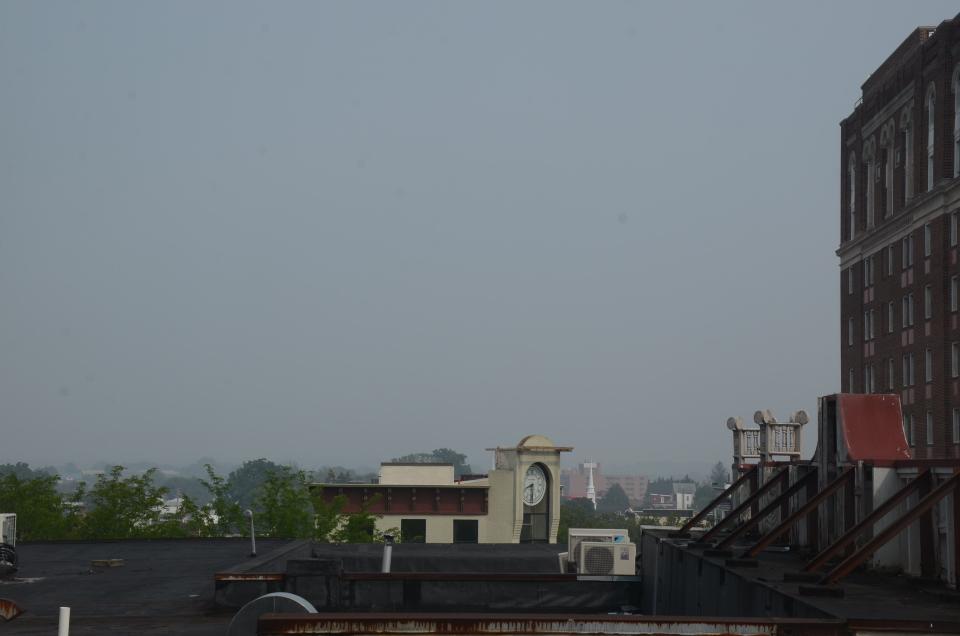Canadian wildfire smoke could linger on-and-off over Washington County until October
Noxious wildfire smoke wafting down from Canada once again plunged Washington County into the red zone for air quality Thursday and Friday, and some projections say it may be an on-and-off reality as long as the wildfires rage.
“Unless those wildfires don't get put out by rain or firefighting methods … there's going to be smoke around and there's the potential that it makes its way into our region, depending on the way the wind direction is moving,” said Cody Ledbetter, a meteorologist for the National Weather Service.
Wildfires raging in Eastern Canada near Quebec continue to funnel a mass of toxic smoke across the northern border and toward the seaboard by northerly winds. Canada’s worst wildfire season in recent history could last for several more months, USA Today reported, which Ledbetter said puts Washington County at the mercy of the wind and rain.

According to AirNow.gov, a real-time air quality tracker, Hagerstown reached a hazardous 176 on the Air Quality Index scale Thursday. This placed the town in the "unhealthy" range, which may have been harmful to the general public but posed a specific risk to people with heart or lung disease, older adults, children and teens, according to AirNow.
Earlier this month, Hagerstown topped out at around 200 on the Air Quality Index Scale and smoke lingered in the sky for several days.
As the fires burn near Quebec, Ledbetter said north and northwestern wind surges will typically result in smoke wafting across the border.
Though the National Weather Service can track wind patterns, Ledbetter said other factors that inconsistently quell the fires such as rain and firefighting measures make the emergence of smoke difficult to predict.
“Does Canada get any rain this week? Is there some activity that, you know, helps the fires die down a little bit?” Ledbetter said. “It's all gonna play a factor, so I can't tell you if we're gonna have smoke in the area next Friday.”
When will the smoke clear?
The last time fires this severe ravaged Canada, smoke lingered over the U.S. for the full fire season, USA Today reported. This means smoke could be present over the U.S. for the full wildfire season from April to October.
The good news is that the wind can change direction quickly and when it does, it swiftly pushes the smoke away, Ledbetter said. He noted that with a strong southerly wind, the smoke can clear out in as little as a day.
“If you remember the last time we had this earlier this month, it moved out pretty quick once the wind shifted out of the south,” Ledbetter said.
In Hagerstown, the current forecast predicts the air quality rating will improve over the weekend, with a moderate air quality level between 50 and 100 from Saturday to Sunday. That is as far as the data extends.
How bad is wildfire smoke for you?
According to Joelle Butler, a public information officer at the Washington County Health Department, chronic exposure to wildfire smoke can reduce a person's lung capacity and increase the presence of certain cancers in the body.
"The American Academy of Pediatrics says that the smoke from wildfires are more dangerous than the particles from dust and dirt because the tiny particles in smoke can be inhaled and can cause the restriction of your blood vessels," she said.
Butler said common symptoms of wildfire exposure include tightness in the chest, burning in the eyes or nose and trouble breathing. She said these symptoms will typically clear with the smoke, but if they persist individuals should contact their doctors.
She said long-term exposure affects everyone, not just the individuals in the at-risk categories.
"Medical experts have really looked at the parts of the world where bad air quality is a way of life, and they're finding that those populations really do have long-term consequences in those populations because of that poor air quality," Butler said.
How can you protect yourself?
Butler said children are especially vulnerable to the health effects of prolonged wildfire smoke exposure because their lungs are still developing. She said repeated exposure in children "can really affect your immune system long-term."
Butler recommended parents consider keeping their children inside or making sure they take frequent breaks when the Air Quality Index reads between 100 and 200.
"So if you're a parent and you've got kids, and they normally will be out for camps or outside, maybe in a pool or something," she said, "you might want to reconsider during an orange and red time."
Butler suggested those who work outdoors should wear a mask to reduce the number of particles they breathe in and ultimately introduce into the bloodstream.
"I think it's just a matter of taking precautions even though it may sound somewhat challenging to have to go back to masking again," Butler said. "Consider it one way of stopping some of those particles from blowing into your lungs."
This article originally appeared on The Herald-Mail: Is wildfire smoke the new normal? Here's what experts say

